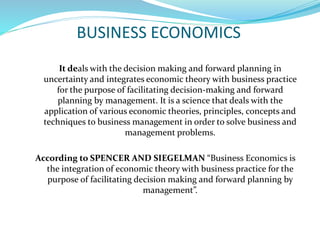Comprehending Financial Principles for Better Organization Decision-Making
In the complicated landscape of contemporary company, a complete understanding of economic concepts can considerably boost decision-making processes. By checking out variables such as market structures and consumer habits, organizations can customize their methods to align with affordable dynamics and customer demands. Understandings into demand elasticity and opportunity expenses provide a framework for maximizing resource allotment. The application of these financial theories often reveals unforeseen obstacles and chances that can redefine calculated methods. What effects do these understandings hold for the future of organization approach?
The Fundamentals of Economic Theory
Economic concept serves as the foundation for comprehending how companies and people make options in the existence of scarcity. At its core, economic concept analyzes the appropriation of minimal sources to please limitless wants. This basic principle of deficiency requires trade-offs, engaging decision-makers to examine the prices and benefits connected with numerous choices.
Both primary branches of economic theory are microeconomics and macroeconomics. Microeconomics focuses on individual representatives, such as companies and consumers, evaluating their actions and interactions in specific markets. It highlights principles like supply and need, rate elasticity, and market balance, which are important for recognizing exactly how prices are established and just how sources are distributed.
Alternatively, macroeconomics checks out the economic situation as a whole, resolving wider concerns such as inflation, unemployment, and financial development. It offers insights right into systemic phenomena that influence all financial representatives, assisting policymakers in crafting reliable economic strategies.
Ultimately, a solid grounding in economic theory is essential for reliable business decision-making. By understanding the concepts of shortage, trade-offs, and market dynamics, companies can much better make and navigate complex environments notified choices that improve their affordable benefit.
Key Economic Indicators
Secret economic indicators serve as necessary tools for analyzing the health and wellness and instructions of an economic climate, offering useful understandings for business decision-making. These indicators are measurable measures that show the financial efficiency and can be classified into leading, lagging, and coincident indicators.
Leading indicators, such as customer confidence indexes and securities market patterns, anticipate future economic activity, permitting companies to prepare for changes in the marketplace. Lagging signs, like joblessness rates and business earnings, offer understandings right into the economy's previous efficiency, helping companies to review long-term trends. Coincident signs, such as GDP development and retail sales, fluctuate concurrently with the economic situation, providing a real-time picture of financial problems.
Understanding these indicators allows services to make enlightened choices regarding investments, resource allowance, and critical preparation. An increase in consumer confidence may trigger business to boost manufacturing in expectancy of higher demand. On the other hand, increasing unemployment rates might result in a reevaluation of expansion plans. By closely keeping track of these essential economic indicators, businesses can navigate unpredictabilities and place themselves successfully in the ever-changing economic landscape, eventually enhancing their decision-making processes and lasting success.

Market Structures and Characteristics
Understanding market frameworks and characteristics is important for businesses intending to flourish in affordable atmospheres. Market structures, broadly classified right into best competition, monopolistic competition, oligopoly, and monopoly, dramatically affect rates visit here approaches, product distinction, and competitive habits. Each framework offers unique difficulties and possibilities that can determine a firm's tactical instructions.
In excellent competition, various little companies complete, bring about minimal pricing power and homogeneous products. On the other hand, in monopolistic competitors, companies separate their items, enabling some degree of pricing power while still dealing with competitors. Oligopolies, identified by a couple of leading gamers, lead to interdependent decision-making; firms must thoroughly think about rivals' actions to their activities. Syndicates exist when a solitary company manages the market, resulting in maximum pricing power but frequently attracting regulatory analysis.
Understanding these characteristics allows companies to anticipate market fads, adapt strategies, and optimize source allotment. Additionally, identifying exactly how exterior aspects like technology and law effect these structures can boost calculated planning. By understanding market structures and characteristics, firms can make informed choices, eventually boosting their competitive placement and driving sustainable growth.
Consumer Actions Insights
Consumer actions plays a crucial role fit service techniques and outcomes. Recognizing exactly how customers make buying decisions, their choices, and the aspects influencing their actions can substantially enhance a firm's ability to fulfill market demands. Secret understandings into customer behavior can be stemmed from analyzing demographics, psychographics, and behavioral patterns.
Group aspects such as age, earnings, sex, and education level supply a fundamental understanding of target markets. Psychographics dig much deeper, discovering customers' way of livings, worths, and mindsets, which can affect brand name commitment and item assumption. Behavior understandings, such as acquiring regularity and feedback to promos, are invaluable for tailoring marketing efforts.
Additionally, external factors like economic problems, social fads, and technical improvements additionally affect consumer options. Throughout economic recessions, consumers might focus on vital products over luxury things, modifying demand patterns.
Applying Business Economics to Approach
Insights got from consumer behavior contribute in creating visit this site efficient company strategies. By leveraging financial principles, businesses can much better comprehend market dynamics, optimize source allowance, and enhance affordable placing. Evaluating need elasticity, for example, allows firms to readjust prices strategies to make the most of revenue while staying attractive to customers.
Additionally, recognizing market segmentation permits companies to customize their offerings, ensuring they satisfy the specific requirements and preferences of varied customer groups. Business and Economics. This targeted strategy enhances consumer fulfillment and cultivates brand commitment

Incorporating game concept right into calculated preparation likewise offers insights right into affordable habits, enabling firms to anticipate competing activities and develop counter-strategies efficiently.

Final Thought
In conclusion, an extensive understanding of economic principles substantially improves service decision-making. By taking a look at market frameworks, examining consumer habits, and evaluating essential economic indicators, firms can develop reliable approaches that straighten with market needs.
In the complicated More about the author landscape of contemporary company, an extensive understanding of economic principles can significantly boost decision-making procedures.Leading signs, such as consumer confidence indexes and supply market patterns, anticipate future economic task, enabling companies to anticipate changes in the market. By very closely checking these crucial economic indications, services can navigate uncertainties and place themselves efficiently in the ever-changing economic landscape, inevitably improving their decision-making procedures and long-lasting success.
By leveraging economic concepts, services can better recognize market dynamics, maximize resource allocation, and boost competitive placing.In conclusion, a thorough understanding of financial principles substantially enhances organization decision-making.